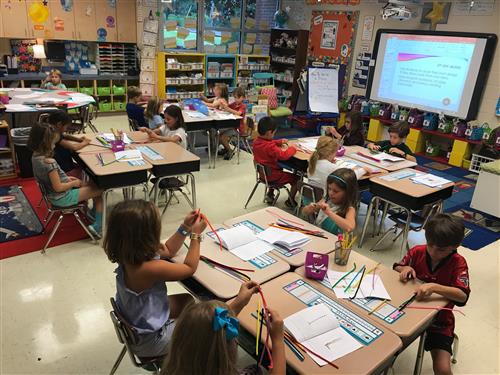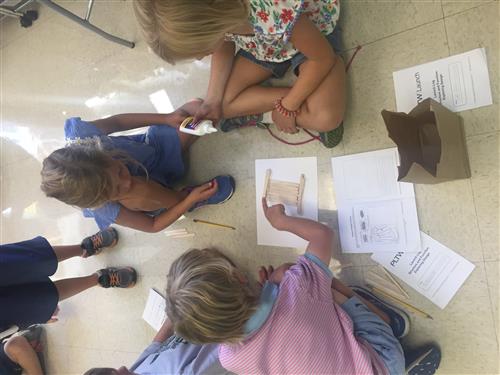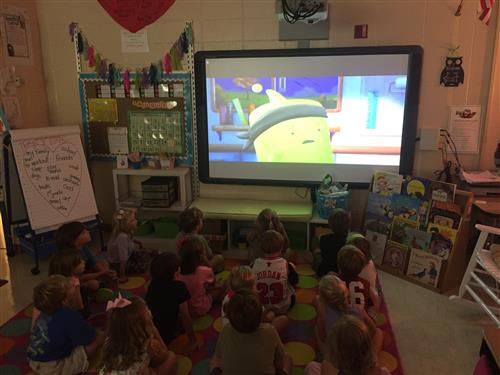-
First Grade Engineering through Literature
Posted by AMANDA McCLUNG on 11/29/2017At the beginning of the school year, first grade implemented Project Lead the Way's introduction to engineering unit using familiar texts such as "The Three Little Pigs" and "Jack and the Beanstalk." Since our initial proposal included a co-teaching model, my schedule allowed me to co-teach with first grade teachers to implement this unit. Co-teaching allowed first grade teachers and students to be exposed to PLTW for the first time and allowed me to train the teachers in an authentic experience.
This PLTW unit was an introductory unit on the engineering design process. As the students built beanstalks and a home for the three little pigs, they learned how engineers influence the world around us. They learned how to ask questions like engineers, brainstorm, plan, create and improve models based on difference scenarios. As a part of the introduction to the design process, the students were challenged to build the tallest beanstalk possible using pipe cleaners. Students compared the height of their models and then added weight to test the strength and integrity of those models. Based on collaboration with others, students were able to fail, ask questions, and try again until they accomplished this challenge.
As a part of this unit, I integrated Carol Dweck's Growth Mindset ideas in order to help the students realize how they can learn from their mistakes and failures instead of giving up when they are trying to accomplish a goal. This is a life lesson we hope to integrate throughout Crestline. We hope our students learn to persevere and grow this idea of having a Growth Mindset throughout their education and life.

Ms. Black's first-grade class begins to design a model of a beanstalk based on the structure and function of a beanstalk.

Ms. Anderson's students working hard to create a house for the three little pigs based on the criteria and constraints of their materials.

We used video lessons from Dojo about the "Big Ideas" of having a Growth Mindset.
-
1st Nine Weeks Science Facilitator Progress
Posted by AMY ANDERSON on 9/27/2017Work Completed by Both Science Facilitators
· Created shared documents with easy to read ALCOS and MB Science Standards for ALL grades (K-6)
- DOK Level for each standard
- Differences in language/rigor
- Correlated with STEMscopes Units
- Correlated with PLTW Units
- Additional resources that can be used to teach each standard
· Created a collaborative document for Scope & Sequence for ALL grades (K-6)
· PLTW
- Ordered and delivered new PLTW materials purchased with grant funds
- Saved all PLTW materials from Canvas (PLTW moved to a different LMS this year)
· Created (from Scratch) and easy to follow small group rotation schedule that incorporates STEAM centers as well as grouping students according to pre-assessment data
K-3 Science Facilitator
· Integrated Growth Mindset lessons into primary-level PLTW unit that teaches the engineering design process
- Modeled lesson in 1st Grade: Haley, Black
· Developed initial Claim, Evidence, Reasoning (CER) Lessons for 2nd and 3rd and modeled lessons: Mitchell, Carter,
· Developed structure for Science Journal for Units 1 and 2 in STEMscopes (3rd Grade)
· Developed Lessons to Teach Design Process (How to Design a Robot)
4-6 Science Facilitator
· Facilitated 5th and 6th Science PLC Meeting
· Developed standards based gradebook for 4th Grade Math
· Developed standards based gradebook for 4th Grade Science (according to Science Practice Standards)
· Leads 4th Grade Math/Science PLC to separate items by standard on all assessments in Math and Science in order to give a standards based grade (4, 3, 2, 1) on each area assessed.
· Co-teaching PLTW Unit on the Human Brain daily in McKerley/O’Neill
· Built VEX IQ Robot and participating in continuous learning on coding VEX robots in preparation for 5th PLTW unit.
· Attend Wednesday and Thursday Robotics Team Meetings every week at the Jr. High
· Developed a more structures science journal that follows the procedures and activities in PLTW Modules: Human Brain and Input/Output Computer Systems
· Organized Solar Eclipse Viewing and resources school-wide


